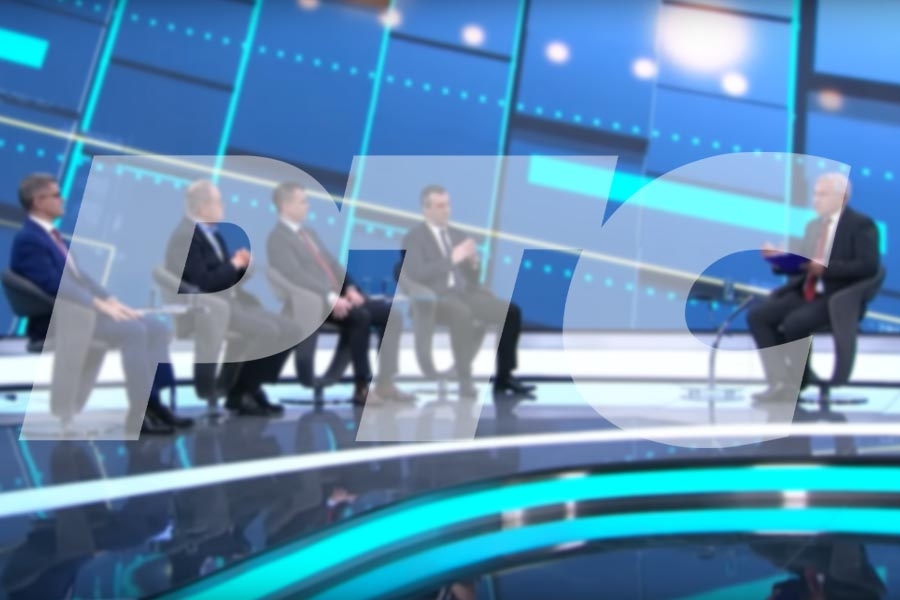According to Demostats assessment, Radio Television of Serbia (RTS) does not have regular debate shows, and the ones that are broadcast do not meet professional standards. Compared to public media services in neighboring countries and more developed European Union countries, debates on RTS are broadcast less frequently and are not part of the regular program schedule.

According to Demostats assessment, Radio Television of Serbia (RTS) does not have regular debate shows, and the ones that are broadcast do not meet professional standards. Compared to public media services in neighboring countries and more developed European Union countries, debates on RTS are broadcast less frequently and are not part of the regular program schedule.

Analyzing the debate shows on Radio Television of Serbia, Demostat concluded that these shows are not part of the regular program schedule but are broadcast "ad hoc." In this way, the Public Service attempts to create the illusion of the existence of debate and dialogue among political opponents. Such debates serve as a "façade" behind which lies the absence of pluralism of opinion and the balanced representation of all relevant political actors (both government and opposition).
In such shows, guests are not only representatives of political parties, but participants advocating pro-government views dominate. This creates the impression of a balanced representation of government and opposition views. Even in this format, there is no critical thinking.
Based on a detailed analysis we conducted, we concluded that citizens are not sufficiently informed and do not have the opportunity to hear critical viewpoints. The debate shows we monitored have developed various methods to suppress substantial criticism, consciously turning dialogue into a farce, shouting matches, and sometimes even insults, while the host neither controls nor directs the conversation. Thus, attempts at dialogue turn into simulations and the illusion of debate, while genuine discussions and confrontations of viewpoints are absent.
We remind that, according to the Law on Public Media Services, Radio Television of Serbia is obliged (based on Article 7, Paragraph 4) to respect and encourage the pluralism of political, religious, and other ideas and to enable the public to be informed about these ideas, without serving the interests of individual political parties and religious communities, nor any other specific political, economic, religious, or similar viewpoints and interests.
According to Demostats assessment, RTS does not have regular debate shows, and the ones that are broadcast do not meet professional standards. Compared to public media services in neighboring countries and more developed European Union countries, debates on RTS are broadcast less frequently and are not part of the regular program schedule.
The debate show "Dijalog" is broadcast within the Morning Program on RTSs First Channel, but it is not part of the regular program schedule and is aired "ad hoc." This format starts a few minutes after ten in the morning, at a time when most of the working population is already at work.
In 2023, which had 52 weeks, "Dijalog" was broadcast only about twenty times, meaning it was not aired 30 times, or more than half the year. It was broadcast 14 times from January 2023 until the announcement of the elections in early November. From November 1 to December 15, five more episodes were aired. This year, broadcasting began on February 22, and six episodes were aired by April. It was not broadcast for the entire month of January and almost the entire month of February.
These debates feature two participants – a representative of the government and a representative of the opposition. Opposition representatives rarely manage to get a word in because, almost invariably, the government representative is more aggressive. Typically, the conversation turns into a quarrel and accusations. The manner of discussion is far from civilized, and the hosts reaction is often absent or, when present, barely influences the conversations course.
During the past year and the first three months of 2024, about twenty representatives of the government and the opposition participated in "Dijalog."
The debate format also includes the symbolically named show "Takovska 10," which was last broadcast on October 31, 2023, meaning it was not aired in November and December. To illustrate, out of 52 weeks in 2023, "Takovska 10" was broadcast only 28 times, and it was not aired for 24 weeks in 2023. This means it was not broadcast for almost six months last year.
In 2024, during the 18 weeks, 14 episodes were aired. The first episode of the year was broadcast on January 9.
These debates are not aired every week, and they are not always political in content, as some episodes address social, economic, and foreign policy topics.
During the past and current year, about 15 episodes featured politicians, meaning only about a third of the episodes were of this type. Generally speaking, the show has four participants, but this number sometimes varies – one, two, or three.
According to Demostats analysis, if the episodes are political in content, the debates often turn into shouting matches, participants interrupt each other, and insults can be heard. Politicians veer off-topic and do not hesitate to insult their political opponents. It is very difficult for viewers to hear what the debate participants say.
Notably, in "Takovska 10," when foreign policy and economic topics are discussed, almost exclusively pro-government or, much more rarely, neutral guests participate.
If there are critical voices, they are noticeably in the minority in the show; for example, out of four guests, only one has a critical stance toward the government in Serbia.
"The longest-running" debate format on the Public Service is "Re? na re?," which has been broadcast since 2012 as a joint production of the Center for Free Elections and Democracy (CESID) and RTS. It is aired exclusively during the election campaign. It represents the most obvious failed attempt to showcase the existence of pluralism of opinion. "Re? na re?" began airing during the campaign for parliamentary elections to inform citizens about the positions of the political parties participating in the elections. Although conceived as a dialogue, it is the most evident example of a façade of debate. The mere presence of representatives from different political parties (both government and opposition) does not mean that dialogue exists. Analyzing the content and rules, it is clear that there is no opportunity for opposition representatives, who are usually in the minority, to present their views without being interrupted, cut off, and insulted. The hosts role has been reduced to reminding participants how much time they have left to answer a particular question and warning them when their time is up.
From the original eight participants, the number has been reduced to four, but unfortunately, this reduction in the number of guests has not contributed to the quality of the content.
Last year, as can be seen on the RTS YouTube channel, seven episodes of "Re? na re?" were broadcast, from November 14 to December 13, during the campaign for the elections held on December 17.
Another debate show broadcast on RTSs First Channel is "Oko," but in practice, "Oko Magazine," which is not a debate show but a collage-type program, is more often aired in that time slot. "Oko" covers political, foreign policy, economic, and social topics, as well as cultural stories.
In "Oko," the guests are most often either pro-government or neutral, while there is hardly any room for critical voices.
On the public services of Croatia (HRT) and Montenegro (RTCG), both government and opposition representatives are featured in political shows.
The Croatian public media service (HRT) offers its viewers debate shows every weekday, except Friday, in prime time as part of its regular program schedule.
The show "Otvoreno" is the central debate show in prime time on HRTs first channel, airing every weekday except Friday. The show features a balanced representation of government and opposition representatives, as well as guests with critical views on various significant social issues. Those critical of the government are equally represented in the shows.
Additionally, the program schedule of the Croatian Public Services First Channel includes "Labirint," a show that airs once a week and deals with social problems and phenomena.
Unlike RTS, the Croatian public media service’s first channel features critical voices in highly-watched time slots, such as the long-running talk show "Nedjeljom u 2." This show invites critics of the government not only from the world of politics but also from science, culture, economics, and sports.
Montenegros Radio Television (RTCG) has a significantly higher number of debate shows compared to the Public Service of Serbia. Daily shows cover various socio-political topics, not only with representatives of political parties but also with experts from specific fields, representatives of civil society, and other media. These shows are broadcast as part of the regular program schedule, with most of them airing after the evening news (Dnevnik 2) in prime time.
The show "Budimo budni – Pitajte Vladu" is broadcast once a week. Journalists and experts from the civil sector in various fields ask questions to government representatives.
Another important debate show, which is aired on all three channels of the Public Service, is "Pres pretres," where editors from other media and representatives from the civil sector engage in debates.
Exclusively political topics are discussed in the debates called "Argumenti," while economic issues are debated in "Okvir."
It is also important to mention the shows "Stav," "Naglas," and "TV Duel," where current topics are debated with various interlocutors.
According to Demostats assessment, the discussions within these debates are mostly civilized, and citizens have the opportunity to hear different opinions and viewpoints.
This analysis concludes that it is essential to enable citizens to be informed about all important topics in society through the Public Service. One of the most important functions of RTS is to present all viewpoints of relevant political actors to the citizens.
In all societies there are issues that are rather being skipped. Certain...
The neoliberal path, started in 2001, has led to especially bad results in Serbi...
For centuries, the region was subsumed within the Ottoman and Hungarian Empires,...
"Serbia has returned to the systemic and anti-systemic position of the political...
In reality, Serbia is closer than ever to NATO. In the course of the last five y...